
17 minute read
StillFarming
The essential work of Arkansas agriculture continues during the coronavirus outbreak #Still Farming by Rob Anderson, Keith Sutton, Gregg Patterson, and Ken Moore photos by Gregg Patterson
When response to the coronavirus outbreak ramped up in March, families across the state went into lockdown and businesses closed or changed their operations in order to continue providing needed services. Meanwhile, the state’s farmers and ranchers continued with their work in order to ensure that people across Arkansas and the country would have what they needed to feed and clothe themselves and their families during crisis.
Those who work in agriculture are accustomed to dealing with challenges, so when the U.S. Department of Homeland Security designated food and agriculture one of 16 critical sectors in the midst of the coronavirus shutdown, they didn’t hesitate to continue operating as an “essential service,” because they were already overcoming obstacles and preparing for spring planting and ongoing livestock care and sales.
Following public health and safety recommendations and facing labor, weather and supply chain problems, they made their way into their fields, pens, poultry houses and workshops every day. They also took time to share with us how they’re continuing to provide the food, fiber and shelter the country needs. Here are the stories of some of those farmers and growers around the state who continue their important work.
continued on page 8>> Adrian Sopshire knows hard work and the discipline necessary to do the dirty jobs no one wants. He says 14 years in the U.S. Navy provided the training for doing those jobs, and that military skillset transfers perfectly into being a farmer.
He’s fond of saying farming is full of dirty jobs and hard work you don’t want to do, but the military taught him the discipline necessary to work through it and get the job done.
Sopshire, 44, runs Fruit of the Vine Farm, a specialty crops farm near Mulberry in Crawford County. He’s the kind of smallfarmer you meet at farmers markets. He focuses on growing vegetables but also grows flowers, raises chickens and eggs, and occasionally goats, pigs and beef cattle. He works with other area farmers to raise farm-fresh products to sell online (www. fruitofthevinemarket.com) and at a fresh vegetable open-air market he oversees in the small Ozark Mountains community of Johnson, located between Fayetteville and Springdale.
Sopshire describes it as a “roadside vegetable market” that he got the opportunity to take over last year. “The people depend on that market for fresh things, and it’s been there for such a long time,” he said. Adrian Sopshire
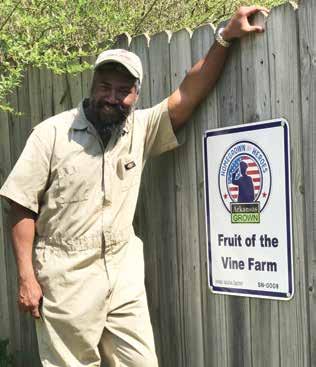
Dealing with disruptions and changed plans due to issues surrounding COVID-19 is nothing new for specialty crop farmer Adrian Sopshire. He credits his time spent in the military with preparing him to deal with any situation that comes up on his Fruit of the Vine Farm in Mulberry.
Sopshire is working with his sister to develop a cut-flower addition to his Fruit of the Vine Farm where he also grows vegetables and raises chickens and goats. Sopshire oversees the open-air market in the historic town of Johnson located between Fayetteville and Springdale.
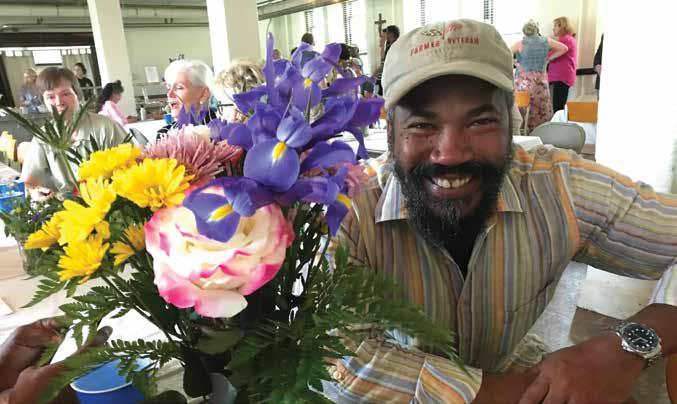
Farmers commonly have to deal with whatever nature throws at them. Usually it’s weather related: things like floods, hail, frost, tornados, drought. Or it can be pests or disease.
There’s an old military saying that every battle plan is a good one until the first shot is fired. Sopshire says he, too, had a battle plan for his farm coming into this year. But things changed quickly when Mother Nature fired the first shot via the weather and then the havoc caused by the coronavirus has come into play.
“It’s amazing how you can come up with a plan. I had a plan,” he said emphatically. “Then the rains came, saturating the ground and delaying my planting.”
Sopshire says the rains actually saturated the ground during a late 2019 storm and flood from a nearby creek that took out a portion of his pasture fence. His farm never adequately dried out during a wet winter and spring so far in 2020.
As part of his plan, he’d replaced the roof on his high tunnel that had been destroyed by straight-line winds two years ago. The plan was to start the vegetables in the high tunnel, then transplant them as seedlings to the 3-acre garden. High tunnels allow vegetable farmers to start growing their crop earlier, before transplanting the seedlings to open ground. However, the ground in the newly re-roofed high tunnel never dried out.
“It was like cake mix in there. You couldn’t stand without your boots getting stuck in the muck,” he said. He grows zucchini, green beans, tomato varieties, cantaloupes and watermelons.
Sopshire had to change plans and plant seeds outside directly into the ground. Continued rain further delayed that planting, so he now finds himself a month behind. A mid-April frost scare had him protecting the garden by covering the newly seeded areas with salvaged plastic sheeting from the destroyed high-tunnel roof. (Nothing goes to waste on a farm.) The coronavirus pandemic and its social distancing is also impacting and will continue to impact his plan.
Last year, Sopshire experimented with developing a flower component for the farm. Without group gatherings like weddings and other events, that market becomes more challenging, as do traditional farmers markets and the Johnson roadside market. He’s working on a new plan for all of that.
“We’ll get through this,” Sopshire said. “I’m learning how to do things I never thought I would do.” • story and photos by Gregg Patterson
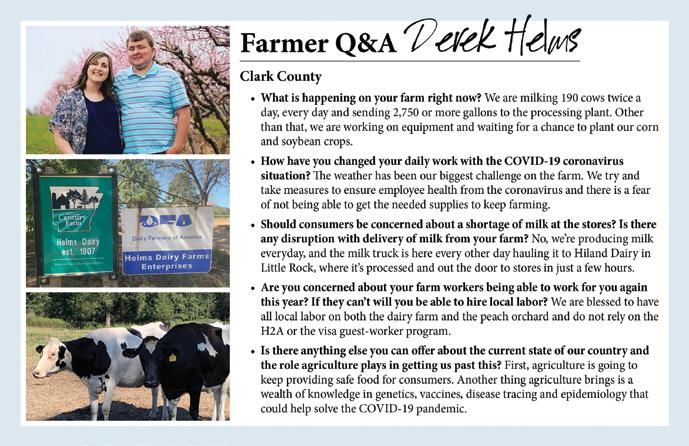
James and Ashton Dixon James and Ashton Dixon raise broiler chickens for Tyson on their farm near Magnolia. The members of Arkansas Farm Bureau’s Young Farmer and Rancher committee have five houses containing 25,500 birds each. “We raise them for seven and a half to eight weeks,” James explained. “At that point they’re collected and taken to the processing plant in Hope. We deliver around 4.5 million pounds of meat to the plant each year, he said.”
The Dixons received their most recent batch of chickens about five weeks ago when the effects of the Covid-19 virus began to spread across the country.
“My serviceman told me recently that ‘out times’ are going to be going up,” James said. “Once they reach around eight weeks old they are collected and delivered to the plant in Hope. Then we’re usually out, or without birds, for two weeks or 14-18 days, but right now I was told out times will be going up about a day and a half on average per week.
“My birds are 28 days old right now,” he explained, “so that means in about three and a half weeks they’ll come and collect them and I’ll start getting ready for the next batch. But, the effects of the pandemic restrictions will affect us because our out times will be about a month longer than they usually are, and that will leave us with the responsibility of paying utilities, propane, electricity – all the expenses that come with
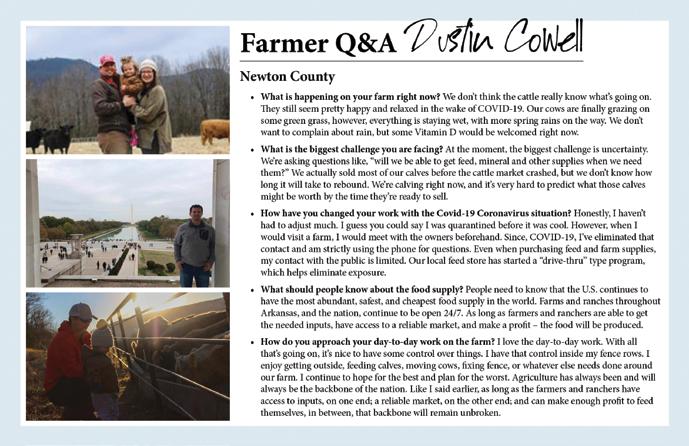
James Dixon says the pandemic will likely leave them with extra expenses and less income from raising chickens.
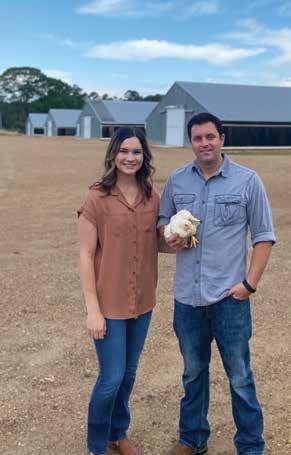
raising chickens and also paying my employee while we are out that extra month. It will leave us with a lot of extra expense while we’re not making money raising birds.”
If the pandemic results in the Dixons losing a batch of birds James says that will obviously affect his bottom line for the year. “Long term, when you’re dealing with broiler houses you don’t have bills in the hundreds of dollars, you’re talking thousands of dollars because of the volume of propane you burn per batch.
“When you’re out a month and there’s no telling how long this (the restrictions and effects of the virus) will last. It could last two or three batches and we usually raise five batches per year. Well, this year we may only end up getting four and that will cut into our bottom line bigtime. Hopefully we’ll only end up with one extended out time. We’ll just have to wait and see,” James said.
Another impact of the pandemic is the diminished demand for product by a major client of the Hope processing plant.
Terry Pollard Terry Pollard lives with his wife Debbie near Piggott in Clay County, not far from the Arkansas-Missouri border. He’s a row-crop farmer through and through. Most years cotton is his main crop, but he also raises corn, rice and some soybeans on the 2,300 acres he farms. Pollard also is an active leader on the Clay County Farm Bureau board of directors.
“With everything that’s happening with the coronavirus, things are a bit different this spring for sure,” he says. “A few months ago, I would not have believed conditions would be like they are now, with people having to stay at home and businesses being closed. Fortunately, we haven’t had any trouble getting what we need for our farm in the way of chemicals and seed and such. Those items are delivered right to our shop, allowing us to continue our social distancing. Getting parts for our farm equipment is another story, though. We must drive to Missouri to the nearest parts store, and things seem a little stricter there than in Arkansas. You’re usually stopped near the front door and have to wait there for someone to help you. But farmers are pretty good at social distancing anyway, so we are ok with that. We kind of practice social distancing during most of the working months anyway.”
Bad weather and a poor economy have created more problems for Pollard than COVID-19.
“The most difficult thing for me has been the idea that we’re putting a crop in the ground right now and there’s probably no way we can make a profit with the depressed commodity prices that we have,” he says. “This is the scariest thing that keeps me awake at night right now. The economy is very concerning, and it’s going to take a while for things to get back on track.
“Our farm hands are local people,” Pollard continues, “and we’ve been able to keep them working. But owners of some bigger farms are having trouble finding enough help. The coronavirus has changed our way of life for sure.”
“Our Hope complex has a contract with McDonalds,” James said. “Like other eat-in and fast food restaurants McDonald’s business is limited to drive-thru only so their sales are down and that’s a major reason Tyson isn’t needing as much production from farmers as normal because consumer and restaurant demand for chicken is down. And that will affect our profitability as well.”
But he said there is a silver-lining.
“I guess one good thing out of this is it’s led people to help each other in ways we may not have been doing before. Finding creative and different ways to do our work and serve our community during these uncertain times.” • story by Ken Moore
Clay County row-crop farmer Terry Pollard says the COVID-19 pandemic has required adaptations to his everyday farm work and depressed commodity prices.
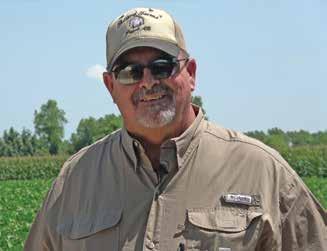
Family values are very important to Arkansas farm families, and according to Pollard, those principles become even more important during times like these.
“My wife and I keep in contact with our parents daily,” he says. “We see our kids every day, too, and that gives us pleasure. They keep us focused on family and what’s good right now for sure. We have been having drive-in church the last several weeks, and now we stay focused on God and his Word more than anything. There’s a reason for what we are going through, and God knows the reason. We just have to trust him more than ever right now, and we’ll get through this pandemic.”
Pollard wrapped up his comments with a few words of praise for Farm Bureau and the state’s elected officials.
“Farm Bureau has been very good about keeping us upto-date on government policies,” he says. “And we’re fortunate that here in Arkansas we have some of the best senators and congressmen. They are really on top of what’s going on, especially for the farmers. Congressman Rick Crawford in my district and Senator John Boozman have been at the forefront of the farm policy, and for that, we are very grateful.” • story and photo by Keith Sutton
Higginbotham Front Porch Ad.pdf 1 2/12/20 4:16 PM
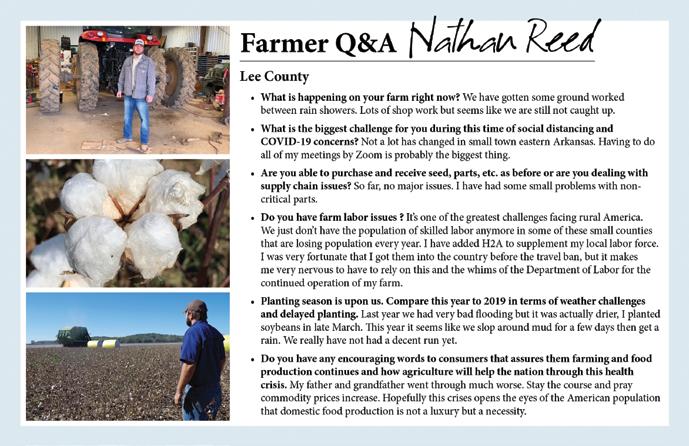
Diane and Steve Higginbothom’s family grows cotton in Marianna. But inspired by Steve’s uncle Charles West, the Higginbothoms grow more than crops. They help Marianna thrive through Arkansas Community Foundation’s smart giving practices benefiting a host of local nonprofits. Their sons, West and Drew, represent a new generation of Community Foundation leaders in Lee and St. Francis counties. Like the Higginbothom family, you want to be a force for good where you live. The Community Foundation can help you create an endowment that impacts your community forever or a fund that meets immediate needs. To learn more, contact Foundation staff today.


Growing
Contact our staff at 501-372-1116
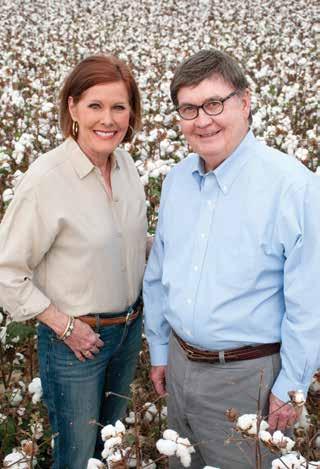
QUAIL: What’s Important

12 I t is widely known that Northern Bobwhite (quail) have declined substantially in the last 60-70 years throughout its entire range. In specific, the United States Geological Survey (USGS) Breeding Bird Count shows a 5.81% decrease in the number of bobwhites heard per year in Arkansas during 2005-2015. Years of research indicate that much of this decline can be attributed to changes in land use/land cover that have eliminated or severely degraded millions of acres of habitat once available for quail.
In 2017, quail management efforts were heightened with intensive management occurring on six focal areas within the state (Figure 1). Since that time 39,034 acres of habitat have undergone some form of management. This figure includes 11,104 acres of habitat work on the AGFCowned quail focal areas (Figure 1).
In addition to work on Commission-owned lands, partner agencies such as the Forest Service, USACOE, National Park Service, and The Nature Conservancy have implemented 5,980 acres of habitat restoration on their respective properties using funding from AGFC.
However, with only 17% of Arkansas’s land mass under public-ownership, that leaves 28 million acres of habitat (home to the majority of Arkansas’ wildlife) under the management of private individuals. With that extensive amount of area under their management control, the influence private landowners have on the existence and condition of populations of species such as quail is tremendous. AGFC realizes the magnitude of affect landowners have on our state’s wildlife and thus have 11 agency private lands biologists and eight Quail Forever farm bill biologists available to provide technical assistance. Providing guidance to landowners on private lands, especially surrounding AGFC quail focal areas and other intensively managed areas, is of utmost importance to creating suitable landscape-scale habitat conditions for quail and other species associated with quail habitat. Quail typically do not range over a few miles, so to better facilitate expansion of populations, habitat restoration should, ideally, occur as close to areas of existing quality habitat (with birds) as possible.
Prescribed burning, timber thinning, and grazing are three of the main methods for improving conditions for quail. Over time, vegetation within fields become dense or overtaken by grass. In order to remedy this, landowners should conduct prescribed burns to remove dead thatch, increase bare ground, and stimulate forbs. Forbs are broadleaf plants that attract insects and produce seed that quail feed upon. Thinning dense stands of timber allows sunlight to reach the forest floor which stimulates ground level vegetation to grow and serve as food and cover. If landowners have cattle, they can accomplish the same conditions that result from prescribed burning by utilizing their cows. Every time a cow takes a bite it is shaping habitat for wildlife that reside in and around that pasture. Leaving some overhead cover (8-14”), allowing forbs and shrubby thickets to remain in and around fields, and adequately grazing vegetation to promote open space/bare ground at ground level should be objectives for landowners who want to maintain or entice quail to their property.
If you are interested in improving habitat on your property for quail, give the private lands or Quail Forever Biologist that covers your county a call to set up a site visit.
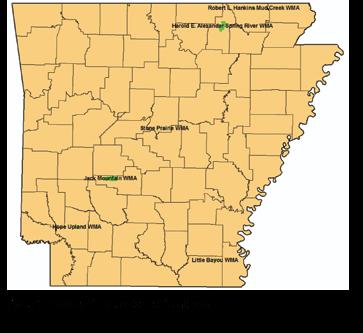
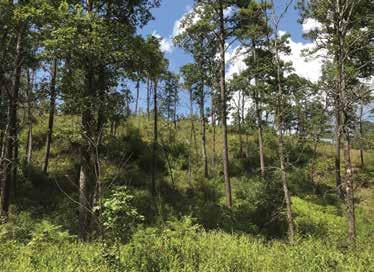
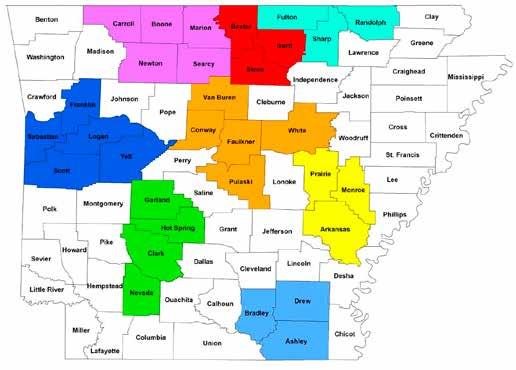
Arkansas Quail Forever Farm Bill Biologists
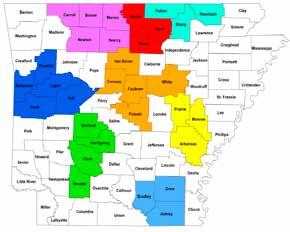
Find A Private Lands Biologist
Kelly Bufkin
Garland, Hot Spring, Clark, Nevada Counties KBufkin@quailforever.org m. (601) 218-8940 | p. (501) 624-2574 ext. 3
Wesley Tucker
Pulaski, Faulkner, White, Conway, Van Buren Counties WTucker@quailforever.org m. (205) 412-9205 | p. (501) 758-2544 ext. 3
Robert Scott
Yell, Logan, Scott, Sebastian, Franklin Counties RScott@quailforever.org m. (870) 751-7045 | p. (479) 495-2441 ext. 3 Ryan Diener, Arkansas State Coordinator RDiener@quailforever.org m. (636) 399-8733 | p. (501) 301-3129 Leslie Fowler, Monarch and Pollinator Coordinator LFowler@quailforever.org m. (208) 431-5233 | p. (501) 301-3169
Dillon King
Izard, Stone, Baxter Counties JKing@quailforever.org m. (817) 564-2420 | p. (870) 368-4413 ext. 3 Wesley Tucker Pulaski, Faulkner, White, Conway, Van Buren Counties WTucker@quailforever.org m. (205) 412-9205 | p. (501) 758-2544 ext. 3 Ryan Diener, Arkansas State Coordinator RDiener@quailforever.org m. (636) 399-8733 | p. (501) 301-3129
Austin Klais
Drew, Ashley, Bradley Counties AKlais@quailforever.org m. (501) 425-1985 | p. (870) 367-8400 ext. 3
Jessica Cox
Boone, Newton, Carrol, Marion, Searcy Counties JCox@quailforever.org m. (479) 206-3836 | p. (870) 741-8600 ext. 3
Robert Scott
Yell, Logan, Scott, Sebastian, Franklin Counties RScott@quailforever.org
Arkansas PheasantsForeverand Quail ForeverFarm Bill Wildlife Biologist positions are funded in partnership cooperation with the Arkansas Game & Fish Commission, Natural ResourcesConservation Service, and Quail ForeverChaptersin Arkansas
Ciera Rhodes
Randolph, Sharp, Fulton Counties CRhodes@quailforever.org m. (731) 439-0027 | p. (870) 892-3623 ext. 3
Alex Hilburn
Arkansas, Prairie, Monroe, Counties AHilburn@quailforever.org m. (501) 733-9416 | p. (870) 255-3573 ext. 3 m. (870) 751-7045 | p. (479) 495-2441 ext. 3
Jessica Cox
Boone, Newton, Carrol, Marion, Searcy Counties JCox@quailforever.org m. (479) 206-3836 | p. (870) 741-8600 ext. 3
Alex Hilburn
Arkansas, Prairie, Monroe, Counties AHilburn@quailforever.org m. (501) 733-9416 | p. (870) 255-3573 ext. 3
Leslie Fowler, Monarch and Pollinator Coordinator LFowler@quailforever.org m. (208) 431-5233 | p. (501) 301-3169
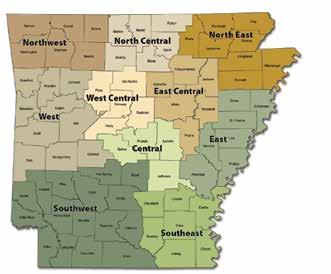
Dillon King
Izard, Stone, Baxter Counties JKing@quailforever.org m. (817) 564-2420 | p. (870) 368-4413 ext. 3
Kelly Bufkin
Garland, Hot Spring, Clark, Nevada Counties KBufkin@quailforever.org m. (601) 218-8940 | p. (501) 624-2574 ext. 3
Central
Jason Honey - 501-580-5390
East Central
Daniel Greenfield - 870-569-8124
Austin Klais
Drew, Ashley, Bradley Counties AKlais@quailforever.org m. (501) 425-1985 | p. (870) 367-8400 ext. 3
Ciera Rhodes
Randolph, Sharp, Fulton Counties CRhodes@quailforever.org m. (731) 439-0027 | p. (870) 892-3623 ext. 3
Arkansas PheasantsForeverand Quail ForeverFarm Bill Wildlife Biologist positions are funded in partnership cooperation with the Arkansas Game & Fish Commission, Natural ResourcesConservation Service, and Quail ForeverChaptersin Arkansas Leslie Fowler, Monarch and Pollinator Coordinator LFowler@quailforever.org m. (208) 431-5233 | p. (501) 301-3169
Dillon King
Izard, Stone, Baxter Counties JKing@quailforever.org m. (817) 564-2420 | p. (870) 368-4413 ext. 3
Kelly Bufkin
Garland, Hot Spring, Clark, Nevada Counties KBufkin@quailforever.org m. (601) 218-8940 | p. (501) 624-2574 ext. 3
Austin Klais
Drew, Ashley, Bradley Counties AKlais@quailforever.org m. (501) 425-1985 | p. (870) 367-8400 ext. 3
Ciera Rhodes
Randolph, Sharp, Fulton Counties CRhodes@quailforever.org m. (731) 439-0027 | p. (870) 892-3623 ext. 3
North Central
Ben Field - 501-442-6197
West Central
Clint Johnson - 501-270-1926
Northeast
Bo Reid - 870-291-1281
Northwest
Hugh Lumpkin - 479-353-7674
East
David Graves - 870-319-0668
Southeast
Bubba Groves - 870-224-3334
West
Michelle Furr - 479-222-5894
Southwest
Ricky Chastain - 870-331-1297





